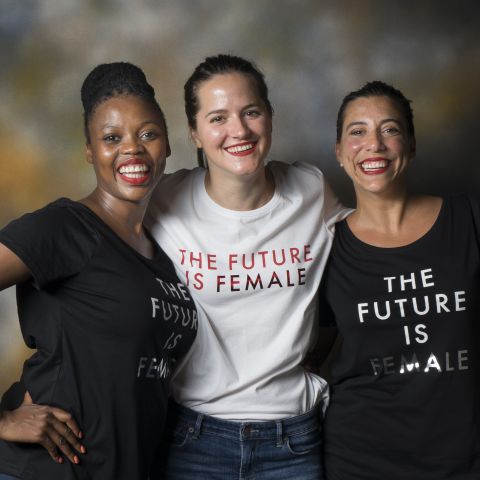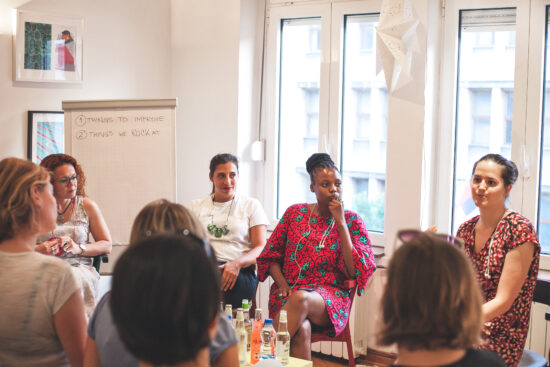
IVLP alumnae and founders of the SheRocks Global podcast: Nwabisa Mayema, Zoja Kukic, and Macarena Botta. Photo credit: SheRocks Global
Editor’s note: Macarena Botta (Uruguay), Nwabisa Mayema (South Africa), and Zoja Kukic (Serbia) are alumnae of the U.S. Department of State International Visitor Leadership Program (IVLP), “Women Entrepreneurs: Alumni as Economic Multipliers.” They are also the founders of SheRocks Global, a podcast that showcases and celebrates “perfectly imperfect women” in business and leadership around the world.
Their IVLP was implemented by IIE, a National Program Agency, and 11 Community-Based Members: Citizen Diplomacy International, Cleveland Council on World Affairs, Colleagues International, Global Ties Detroit, Global Ties KC, Global Ties San Francisco, World Affairs Council – Cincinnati & Northern Kentucky, World Affairs Council – Dallas/Fort Worth, World Boston, World Chicago, and World Denver.
The three of you met on a 2018 IVLP exchange. How and when did you decide to work together on the SheRocks Global podcast?
Within three months of concluding our IVLP exchange, we were already talking to each other and desperate to stay in touch so we could see each other in our respective countries and around the world. Being project-focused entrepreneurs, we thought it would be really cool to work on something together that would compel us to stay connected. We didn’t know what the something was, but through our regular calls, we realized that there was something valuable about the sharing of wins, challenges, questions, etc. that was happening. That is how SheRocks Global was born! We also realized that no matter the latitude we were born in, women face similar challenges, and that we can still learn so much even if these challenges are completely different.
What was it about your IVLP experience that inspired you to launch the podcast?
Zoja is good about reminding us about the first time we all met during our IVLP exchange: imagine 41 women, gathered from 38 countries, in the same room, and each woman is provided with two minutes to present herself. As each woman gets up to speak, every other woman is shrinking in her chair and asking herself, “there must be a huge mistake, how on earth am I in this room with these rock stars when I am but little old me?.”
We only discovered that we were all thinking the same thing a few days into our exchange. It made sense to us to draw on that experience because it speaks to the idea that all women are perfectly imperfect in their respective corners of the world, and in that perfect imperfection, every woman who listens to our podcast rocks.
What does it mean to be “perfectly imperfect” and why do you strive to highlight this idea in your podcast?
For us, perfectly imperfect is that whoever you are in this very moment is who you are. There is nothing right or wrong about who and where you are. What we know for sure is that we are perfect with all that we bring into the room, even the parts of ourselves that we think are flawed. So, we accept our imperfections as part of the perfection – perfectly imperfect.

Photo provided by SheRocks Global
You interview women from all around the world, living different lives in different places. What qualities or elements do you look for when selecting speakers for your podcast?
We thought it was interesting for us because each of us has found herself “trapped” in our own “success” at some point. Without knowing, we found ourselves having to present ourselves as superheroes, and that is exhausting. We strive to highlight the idea of perfectly imperfect as an act of defiance, an act of liberation.
We try to create a safe space in which we can exchange with our guests from a more genuine perspective. This means that our guests are successful women, who also share parts of themselves, which are not that successful. For example, you will hear a superstar entrepreneur talking about her fear of not finding true love, or a great business woman whose regret is that she didn’t go global while she was young and thinks it might be too late now.
In your very first episode, you spoke with Lesley Waterkeyn and discussed what it means to be a working woman, and in her case, the primary breadwinner of the household. What advice do you have for other women who are looking to advance in their careers, but may not have a supportive partner or network, who supports them?
Interestingly, this is the very moment in which I would encourage people with these questions to listen to Lesley and see what resonates with them from that conversation. We try really hard not to give advice, but to showcase as many different stories and options as possible. Often, we as women feel pressured to have it all — a thriving career, a perfect family, a great figure… And this is a huge pressure to live by. We believe that women should prioritize based on their own gut, and not everyone else’s expectation. The point of the podcast is that the conversations that we bring to light are hopefully enough to have a listener say to themselves, “aaaah, I don’t have to be perfect to feel good about myself.”
In your fifth episode, you met Ange Muyubira and discussed the importance of failure and perseverance in relation to success. Reflecting on your own career trajectories, maybe even in creating this podcast, can you share what you have learned or how you have grown from your missed steps?
- See things for what they are. We started this podcast as a passion project, and at one point, we got ourselves in a massive tangle – and then got stuck – because we veered into treating it like a commercial project.
- Collaboration works. We have found our momentum through the networks of collaboration that we have: access to resources, expertise, and guests! We initially thought that we needed to know everything and do everything ourselves, and so when we applied for funding, we would present these really big budgets and would be quite disappointed when we weren’t receiving assistance. When we changed our approach to a partnership-driven approach, we received what we needed to receive to get the podcast out there.
- Embrace imperfection — No beginning is ever ideal, so that should not stop us. It was a trap we fell into ourselves with the podcast, but then reminded ourselves that, no matter how hard we try, it will never be perfect, but it will be enough, and only by doing we can make it better.
Why is mentorship important to all of you, and how can women, regardless of where they are in their careers, help support and empower other women to succeed?
We have thrived in a network of mentors. I am mentored by those who are next to me, those who have gone before me, and those who come behind me. Of the three of us, Nwabisa is the most experienced in this area. At the moment, she is a huge fan of “appreciative inquiry” — being in a conceptual space with those she mentors and those she is mentored by — where questions are asked with genuine curiosity. Most of the time, it comes down to one question: why do you do what you do? If we focused on that question when engaging with other women, we set each other up for success (however it is defined), and in turn, we empower each other.
We believe building bridges between women is the way to empower and create more and better opportunities for the future.
The new season of SheRocks Global will be available March 8 on any podcasting platform. For more updates and information, visit SheRocksGlobal.com and follow them on Facebook and Instagram.
